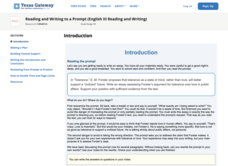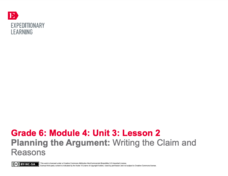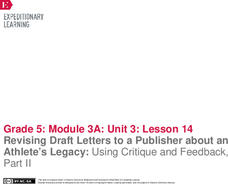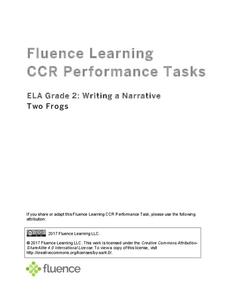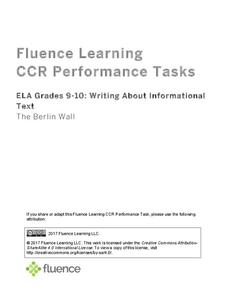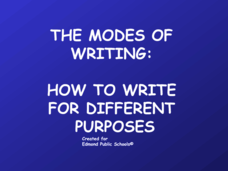Poetry4kids
How to Write a Concrete or “Shape” Poem
Writers compose an original shape poem. Scholars choose a subject to write about and create a visual representation by forming a corresponding picture using the poem's words.
Poetry4kids
How to Write a Diamante Poem
A lesson begins with a description of a diamante poem and the rules to follow while writing one. Scholars examine the ins and outs of synonym and antonym diamantes, then compose an original poem using their newfound knowledge.
ReadWriteThink
Persuasive Essay: Environmental Issues
Young environmentalists learn how to craft a persuasive essay about an environmental issue they consider important. After studying the components of a persuasive essay and examining a student model, writers brainstorm possible topics and...
California Department of Education
Hitting the Write Note: Writing a Proposal
To whom it may concern ... Scholars undergo the process of writing a letter to an authority figure. The lesson asks writers to compose a formal letter requesting a music therapy space. Pupils learn how to submit a project proposal to any...
Overcoming Obstacles
Writing Reports
Following a review of how to research and take notes, scholars define the term paraphrase and identify ways to organize information and finish reports. To put their newfound knowledge to the test, learners interview a peer, take notes,...
Texas Education Agency (TEA)
Reading and Writing to a Prompt (English III Reading and Writing)
Learning to read and write in response to a prompt is an essential skill. Users of this interactive learn how to analyze a writing prompt to determine the many facets that must be addressed, how to plan and structure a response, and how...
Curated OER
Nonfiction Genre Mini-Unit: Persuasive Writing
Should primary graders have their own computers? Should animals be kept in captivity? Young writers learn how to develop and support a claim in this short unit on persuasive writing.
K12 Reader
Revise Your Writing
The importance of revising writing is the focus of a short reading comprehension worksheet that asks readers to respond to a series of questions based on the article.
Open Oregon Educational Resources
Oregon Writes Open Writing Text
Are some resource books more confusing than helpful? The creator of Oregon Writes Open Writing Text thinks so. That is why the text remains a living document with input from teachers, librarians, and scholars. The eBook begins with...
EngageNY
Planning the Argument: Writing the Claim and Reasons
Step up! Using the resource, scholars discover the six steps to writing an effective position paper. Next, they work on a graphic organizer to begin planning their argument-based essays.
EngageNY
Mid-Unit Assessment: Completing My Draft Position Paper
What's the difference? Scholars analyze the similarities and differences between introductory and concluding paragraphs. Then, using a model essay as a guide, they write their draft position papers.
EngageNY
Revising Draft Letters to a Publisher about an Athlete’s Legacy: Using Critique and Feedback, Part II
Let's get opinionated. Scholars participate in a peer critique and revision process using a fun activity called a Four Corners strategy. After incorporating classmates' feedback, individuals share their final drafts of their opinion...
EngageNY
Revising Draft Letters to a Publisher about an Athlete’s Legacy: Critique and Feedback, Part I
Pick a corner, any corner! Pupils use the Four Corners strategy and Peer Critique protocol to assess one another's draft letters to a publisher about an athlete's legacy. Scholars then use peer feedback to revise their letters.
Trinity University
Explain Yourself: An Expository Writing Unit for High School
Introduce expository writing with a unit that asks writers to craft an essay to explain a belief, value, or priority that is important to them. Mini-lessons within the unit focus on crafting thesis statements and conclusions, selecting...
Fluence Learning
Writing an Opinion: Student Council
A three-part assessment challenges scholars to write opinion essays covering the topic of the student council. After reading three passages, writers complete a chart, work with peers to complete a mini-research project, answer...
Fluence Learning
Writing a Narrative: Two Frogs
Three options offer young writers the opportunity to read a short story, answer questions, and write a response. A handy language arts resource focuses on reading comprehension and analyziing the story's lesson: look before you leap.
Super Teacher Worksheets
Writing Couplets
Sometimes, getting started is the hardest part; but that is not the case with this poetry worksheet that asks scholars to read through a list of rhyming pars, choose three, and use them to write a couplet poem.
EngageNY
Writing and Evaluating Expressions—Multiplication and Addition
How many people can sit around a table? The 22nd part in a series of 36 continues the work on writing and evaluating expressions to include expressions with two operations. Pupils use models to determine an expression for the number of...
Fluence Learning
Writing About Informational Text The Berlin Wall
On June 26, 1963 President John F. Kennedy delivered his famous "Ich bin ein Berliner" speech close to the Berlin Wall at the Rudolph Wilde Platz. On June 12, 1987 President Ronald Reagan Delivered his famous "Mr. Gorbachev, tear down...
Edmond Public Schools
The Modes of Writing: How to Write for Different Purposes
Do your pupils know the difference between varying types of writing? This 57-slide presentation is made up of four sections: narrative writing, descriptive writing, expository writing, and persuasive writing. Split it up and use the...
Curated OER
Proofreading, Revising, & Editing Skills Success
Some self-paced writing resources are just better than others. This one is great. The 205-page packet includes exercises on every aspect of the writing process, from crafting sentences and paragraphs, to proofreading, revising, and...
Portland Public Schools
Opinion: Persuasive Essay Unit Introduction
Opinion, audience, purpose. Fourth graders are introduced to the three characteristics of persuasive writing in the third unit of a year-long writing program. The 98-page packet is complete with plans, model essays, graphic organizers,...
Curriculum
Expository Writing
The beauty of the way this expository writing resource is structured is that the units can be presented as a complete writing workshop or sequenced throughout a course of study
EngageNY
Writing: Drafting Body Paragraphs and Revising for Language
Begin the drafting phase of the writing process with a lesson plan focused on logically writing three body paragraphs. Then, revise the writing to make it more formal after a teacher-directed mini-lesson plan. Each paragraph highlights...
Other popular searches
- Descriptive Writing
- Creative Writing
- Persuasive Writing
- Narrative Writing
- Letter Writing
- Essay Writing
- Writing Process
- Writing Autobiography
- Writing Technique
- Expository Writing
- Writing Fables
- Paragraph Writing







